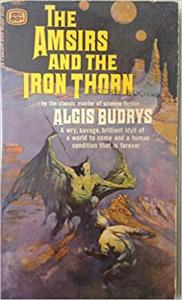If Plato is in fact someone who should be read by Christians, as was argued in a book reviewed previously here, then it stands to reason that those inspired by Plato are also worth reading. Otherwise, it’s hard to defend Algis Budrys’ weird little tale The Amsirs and the Iron Thorn.

I should note right off the bat that this isn’t a very good book. Which is unfortunate, because Budrys was a competent writer with an interesting perspective (as we might expect from a Lithuanian exile living in the US during the Cold War). The Amsirs and the Iron Thorn just doesn’t quite land as well as it could have.
And yet, I’m reviewing it in the context of Plato, because Plato’s Republic is the clear inspiration behind this book. Honor White Jackson was a member of the military caste on an alien (to us) planet, above the lowly peasants but below the leadership who are truly ‘in the know.’ This is pure Plato. Budrys’ commentary is that those at the top really aren’t perhaps all that wise (no doubt echoes of his experiences with communism are showing up here) and that much of what they know is all about keeping people in their place.
But it doesn’t stop there [spoiler alert from here on out], Jackson escapes the planet and returns to Earth, and along the way learns that his planet had been a sort of colony/experiment on the part of ancient humans. On Earth, he encounters yet another society, itself divided into Plato’s three categories of workers, soldiers, and leadership–albeit in a different form than they had existed on Jackson’s home planet. And yet, just as on his home planet there’s a rot at the heart of this society that goes largely unnoticed until someone from the outside arrives to see and expose it. We’re left in the end with Jackson and an an Earth woman going off to form their own society, with Jackson doing his best to tell only the truth. The implication being that either this time they’ll have a society with genuine foundations, or that the result will be just another hierarchy dedicated to controlling the lower orders and keeping the upper orders in power. The tension is undoubtedly intentional.
Again, this isn’t a great book. But it is an interesting interpretation of Plato’s political structure, and as such something that should be of interest to Christians. Plato’s ideas about God, history, and morality that have historically affected Christian thinkers are not isolated from his social and political thought. And if we don’t like what we see in his social and political thought (and it is very much a mixed bag), that should raise questions about the rest of his thought. If we do like what we see there (again, it’s a mixed bag) then that should also raise questions about the rest of his thought. In either case, it’s a good way to meditate on how Platonic ideas interact with the world and shape or are shaped by what we know to be true about the God of the Bible.
Dr. Coyle Neal is co-host of the City of Man Podcast and an Associate Professor of Political Science at Southwest Baptist University in Bolivar, MO












